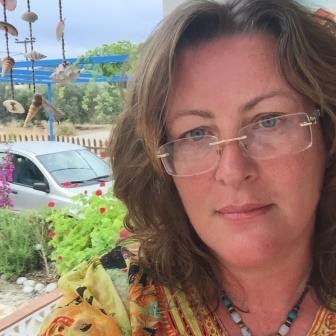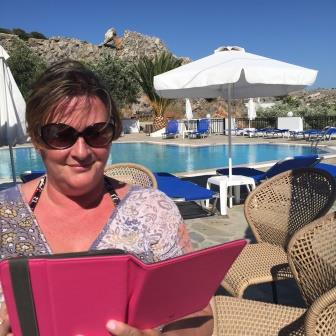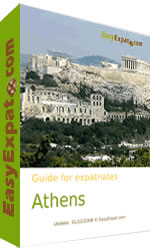From UK to Kuwait to Greece: Olive, Feta and Ouzo
 Hi, I’m Amanda Settle. A British expat, a bit of a nomad we’ve lived in
Kuwait, Dubai, Qatar and are now in a small village on the Greek island of
Rhodes. Living with my husband and our rescue animals: 1 cat from Dubai, 2 cats
from Qatar and dog we’ve rescued here.
Hi, I’m Amanda Settle. A British expat, a bit of a nomad we’ve lived in
Kuwait, Dubai, Qatar and are now in a small village on the Greek island of
Rhodes. Living with my husband and our rescue animals: 1 cat from Dubai, 2 cats
from Qatar and dog we’ve rescued here.
1. Why did you move abroad?
I left the UK for work and a better life. I was teaching in London, the
money was barely enough to live on and I didn’t have time to actually have a
life. There was no respect for my profession by the students, parents,
management of the school system or society as a whole.
I’d always wanted to travel more and decided to just go for it. I had no idea when I got on the plane to Kuwait what it would be like and if I’d be on the next flight home. 9 years on and I’m hooked.
2. How do you make a living?
I’m a secondary school English teacher. I started out
in Kuwait teaching in an English curriculum school then moved to the
International Baccalaureate in Dubai and Qatar.
International teaching is very different to teaching back home. They are private schools where profit is the most important factor for the owners. The teachers are in reality little more than expensive servants.
The local students are very respectful but reluctant to learn as their futures are already financially secure. After all they are sons and daughters of multi billionaires.
Overseas schools also had a mix of students and teachers from all over the world, it was an amazing experience. There were very few discipline issues and the main problem with parents was that they were a little too keen and constantly wanting to know why their offspring had 98 rather than 100 this time.
In Greece I’m primarily a housewife, I do lots of different things, I’m an on-line examiner for the IB, make and sell chutneys and jams, cakes and crafts. I’ve finally got time to do some of things I’ve always wanted like growing our own food and writing my blog.
3. How often do you communicate with home and how?
The internet was never good enough in the Middle East
for skype to work properly, though we tried. In Kuwait, Dubai and Qatar we only
had mobile phones to make international calls and the costs were a little too
much for regular phone calls.
Our main contact was through emails, Facebook and messages. Plus of course the occasional card. The post was bad everywhere we’ve lived lots of things just never arrived.
My parents are expats here too, so we now have a fewer calls to make.
4. What's your favorite thing about being an expat in
Greece?
The people and the place are just amazing here. We live on an island;
there are no shopping malls and very few international brands available to buy.
There’s very rarely a traffic jam. There’s clean fresh air, the clearest bluest
waters I’ve ever seen.
We live less than 10 mins from a beach in any direction and they are all wonderful to swim from.
The fruit and vegetables are better than any I’ve seen in years. Fresh, grown locally, organic and taste amazing. The meat is also very good, in particular the lamb and goat. Of course there are also the local Greek products olives, feta and ouzo.
It’s a simpler life and a more rewarding one.
5. What’s the worst thing about being an expat in Greece?
Trying to work out how to do the basics that you take for granted back
home; sorting out phone connection, buying a car, getting a tax number. All of
these involved visits to lots of different places and queues. Although to be
honest it’s the same bureaucracy all over the world.
The cost of imported goods, not only is there the import cost but also the island cost. It’s almost like there is a separate island tax especially on things like vehicles.
The other frustrating thing for me is trying to learn the language; it’s very hard when even the majority of Greeks talk English. I try and practice as I’m learning but it’s a very slow process.
Living on the island means that most travel means going via Athens, it adds to the cost and time that you travel. During the tourist season there are direct flights to the UK and other European cities but most flights are relatively expenisve.
Something that surprised me most about Greece is the potential for natural disasters which we never encountered anywhere else. We are in an earthquake zone and there are regular small quakes. Though we don’t feel most there have been a few. There are regular serious forest fires in the summer. We see the fire planes head into the sea nearby and fly over the house. There has been flooding in our village in both the winters we have lived here. From what I’ve found out now there is always flash flooding on the island in winter.
Everyone mucks in helps out when things happen, but it’s not something we had thought of before moving here.
6. What do you miss most?
After so long away there isn’t much that I miss now in the way of
things. Besides family and friends the one thing we always have wherever we are
is Yorkshire tea bags! (It’s an English thing!)
7. What did you do to meet people and integrate in your
new home?
Each place is different, in the Middle East
integration in the expat community came with our jobs. Most of our friends were
in some way related to the work we did.
Kuwait is the only country in the Middle East where I really made friends with a few locals and I’m still in touch with them years later. Those I met through other expats.
In Greece it’s been different because my parents are also expats here, so we started out by meeting their friends. It’s a much smaller expat community and a very different one.
People who work here during the season work every day from April to the end of October so you really only see them in the winter months. Those who don’t work tend to be retired.
We’ve met a few locals through living in a village, it’s a slow process but they are getting to know us. It would be very similar moving to a village back home it takes the locals a while to accept new people.
8. What custom/ habits do you find most strange about
your adopted culture?
The pace of life is so much slower than anywhere else we’ve lived,
though it’s also one of the things we love.
They definitely do things in their own time. If you call and make an appointment for someone to come they will often turn up days later. Tomorrow or αύριο can be any time in the future. The Arabic inshallah was often used in the same way.
Birthdays aren’t celebrated in the same way, instead their name day is far more important. Each day is assigned different saint’s names and there are lots of different celebrations and festivals related to the Orthodox Church.
In Arabia there was the fasting of Ramadan, here there is Lent which many take far more seriously than we are used to seeing back home.
I think as you travel and live in different places it’s those customs and habits that are different that you come to enjoy. Here there’s a real sense of community and family. It’s safe for children to play outside without supervision. Everyone in the village knows them.
9. What is a myth about your adopted country?
The myth that they don’t
work hard is definitely not true from what I’ve seen. Yes there is a culture of
sitting around and drinking coffee but that doesn’t mean they don’t work. I see
them working the land around us, working in the bars, tavernas, and tourist
industry it’s long hard hours in the heat of summer.
One myth is quite true though; if you put some Greek music on they really will get up and dance. Most know the steps and are taught them as children. It’s wonderful to see at festivals and parties.
10. Is the cost of living higher or lower than the last country you lived in and how has that made a difference in your life?The general cost of living in Greece is lower than Qatar. If it wasn’t we wouldn’t be able to live here right now and I’d need a full time teaching job which would be somewhere else in the world.
Many imported goods aren’t much cheaper here we just don’t buy too many.
Electronic goods tend to be more expensive here than the Middle East. Plus the costs here keep going up with the raises in VAT brought about by the current financial situation.
I wonder what will happen with the current financial situation in Greece. It’s very difficult to know what the future holds for the country. We do know that there are more VAT increases due to take effect at the end of the tourist season on the islands.
11. What advice would you give other expats?
- Research before you go
- Speak to other expats that have lived or are living where you intend to go.
- Check contracts very carefully.
- Remember that you are a visitor and respect the culture.
- Expected the unexpected (I met my husband in Kuwait)
- No matter how well you plan things will go wrong.
- Enjoy the experience and record it in some way.
12. When and why did you start your blog?
I first started the blog when we decided to leave Qatar and move to
Greece. It was a very mad surreal time and I wanted to share it with family, friends
and other expats. I had thought of starting one before but my job prevented it
in many ways.
When we first arrived I stopped for a while as we got settled in and found our feet. Then in February this year I fractured my leg and had to stop and rest, that’s when I started up writing again. Now there’s no stopping me!
 Amanda's blog, Olive, Feta and Ouzo
Amanda's blog, Olive, Feta and Ouzo

To find out more about living in Greece, refer to our
To be considered for an interview (as well as other articles), add your blog to BlogExpat
Part of the EasyExpat.com adventure since 2008. Drink, Travel, Write